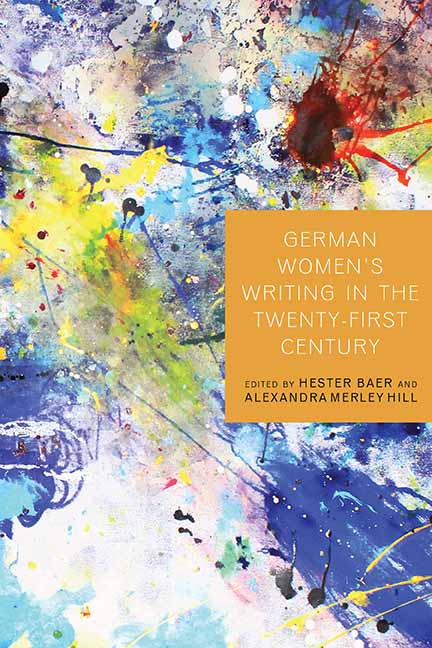Book contents
- Frontmatter
- Dedication
- Contents
- Acknowledgments
- Introduction: German Women’s Writing Beyond the Gender Binary
- 1 Language-Bodies: Interpellation and Gender Transition in Antje Rávic Strubel’s Kältere Schichten der Luft and Judith Hermann’s “Sonja”
- 2 Matrilineal Narrative and the Feminist Family Romance
- 3 The Pitfalls of Constructing a Female Genealogy: Cultural Memory of National Socialism in Recent Family Narratives
- 4 Reckoning with God: Attitudes toward Religion in German-Language Women’s Writing in the Twenty-First Century
- 5 Muslim Writing, Women’s Writing
- 6 Popfeminism, Ethnicity, and Race in Contemporary Germany: Hatice Akyün’s Popfeminist Autobiographic Works Einmal Hans mit scharfer Soße (2005) and Ali zum Dessert (2008)
- 7 The Awkward Politics of Popfeminist Literary Events: Helene Hegemann, Charlotte Roche, and Lady Bitch Ray
- 8 The Indictment of Neoliberalism and Communism in the Novels of Katharina Hacker, Nikola Richter, Judith Schalansky, and Julia Schoch
- 9 Sounds of Silence: Rape and Representation in Juli Zeh’s Bosnian Travelogue
- Bibliography
- Notes on the Contributors
- Index
5 - Muslim Writing, Women’s Writing
Published online by Cambridge University Press: 25 May 2021
- Frontmatter
- Dedication
- Contents
- Acknowledgments
- Introduction: German Women’s Writing Beyond the Gender Binary
- 1 Language-Bodies: Interpellation and Gender Transition in Antje Rávic Strubel’s Kältere Schichten der Luft and Judith Hermann’s “Sonja”
- 2 Matrilineal Narrative and the Feminist Family Romance
- 3 The Pitfalls of Constructing a Female Genealogy: Cultural Memory of National Socialism in Recent Family Narratives
- 4 Reckoning with God: Attitudes toward Religion in German-Language Women’s Writing in the Twenty-First Century
- 5 Muslim Writing, Women’s Writing
- 6 Popfeminism, Ethnicity, and Race in Contemporary Germany: Hatice Akyün’s Popfeminist Autobiographic Works Einmal Hans mit scharfer Soße (2005) and Ali zum Dessert (2008)
- 7 The Awkward Politics of Popfeminist Literary Events: Helene Hegemann, Charlotte Roche, and Lady Bitch Ray
- 8 The Indictment of Neoliberalism and Communism in the Novels of Katharina Hacker, Nikola Richter, Judith Schalansky, and Julia Schoch
- 9 Sounds of Silence: Rape and Representation in Juli Zeh’s Bosnian Travelogue
- Bibliography
- Notes on the Contributors
- Index
Summary
WOMEN's MEMOIRS THAT SHARE common themes of forced marriage, honor killing, or “crimes of honor” and detail the cruelty and violence to which the protagonist is subjected during her quest to pursue a “Western” lifestyle have been a part of the German-language literary landscape for decades. As they are increasingly tied to Islam, however, these memoirs have become especially visible in the twenty-first century. The similarity of these works is reinforced by marketing conventions, including sensational titles like Ich wollte nur frei sein: Meine Flucht vor der Zwangsehe (I Only Wanted to be Free: My Flight from Forced Marriage, 2005), Mein Schmerz trägt deinen Namen: Ein Ehrenmord in Deutschland (My Pain Carries Your Name: An Honor Killing in Germany, 2005), or Mich hat keiner gefragt: Zur Ehe gezwungen—eine Türkin in Deutschland erzählt (No One Asked Me: Forced into Marriage—a Turkish Woman in Germany Explains, 2007). Such texts are also linked by similar cover designs featuring portraits of distraught and veiled, or defiant and bareheaded women, many of whom are the author-narrators using obvious pseudonyms like Ayşe, Leila, or Inci Y. Many of these memoirs have been bestsellers, have been printed in multiple editions, and are available in translation throughout much of Europe and North America. They are often framed as critiques or exposés of Islam, cited together as evidence of various problems with Islam in Europe, and categorized together by booksellers. Some of the most polemical author-narrators of such works have successfully published second books and developed careers as public speakers and activists.
Yet few categories of writing seem so immediately and obviously problematic as that of Muslim women's memoirs: after all, the impact of an author's faith and gender on a text is inextricably linked to linguistic, cultural, socioeconomic, and many other factors that are obscured by the use of the label “Muslim women's memoir,” as is the participation of those who are neither Muslim nor women in the writing of the texts. The label appears to connect certain kinds of violence with religious faith and to support the continued racialization of Islam; the very existence of the genre indicates a standardization of diverse experiences and opinions, while its profitability suggests the potential exploitation of authornarrators, the trivialization of gender violence, and the reinforcement of destructive stereotypes about women and about Islam.
- Type
- Chapter
- Information
- German Women's Writing in the Twenty-First Century , pp. 95 - 112Publisher: Boydell & BrewerPrint publication year: 2015

